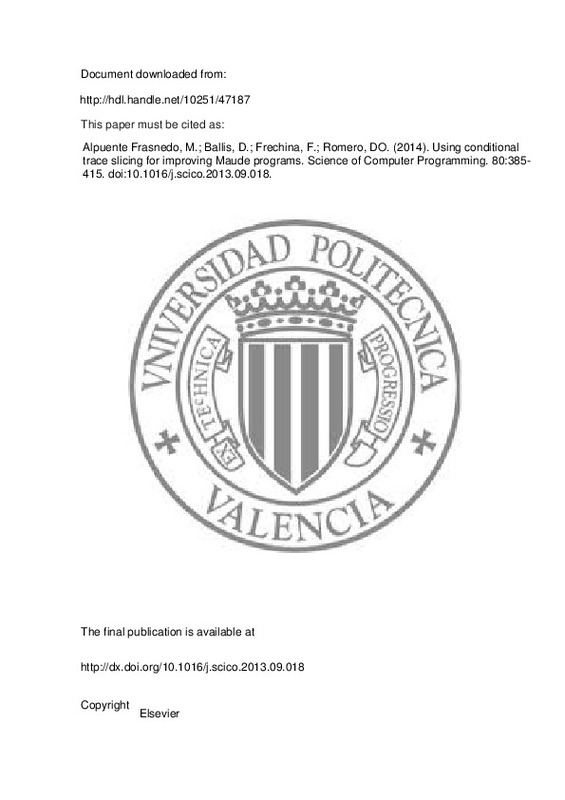JavaScript is disabled for your browser. Some features of this site may not work without it.
Buscar en RiuNet
Listar
Mi cuenta
Estadísticas
Ayuda RiuNet
Admin. UPV
Using conditional trace slicing for improving Maude programs
Mostrar el registro sencillo del ítem
Ficheros en el ítem
| dc.contributor.author | Alpuente Frasnedo, María
|
es_ES |
| dc.contributor.author | Ballis, Demis
|
es_ES |
| dc.contributor.author | Frechina, F.
|
es_ES |
| dc.contributor.author | Romero, Daniel Omar
|
es_ES |
| dc.date.accessioned | 2015-02-17T11:12:30Z | |
| dc.date.available | 2015-02-17T11:12:30Z | |
| dc.date.issued | 2014-02-01 | |
| dc.identifier.issn | 0167-6423 | |
| dc.identifier.uri | http://hdl.handle.net/10251/47187 | |
| dc.description.abstract | [EN] Understanding the behavior of software is important for the existing software to be improved. In this paper, we present a trace slicing technique that is suitable for analyzing complex, textually-large computations in rewriting logic, which is a general framework efficiently implemented in the Maude language that seamlessly unifies a wide variety of logics and models of concurrency. Given a Maude execution trace T and a slicing criterion for the trace (i.e., a piece of information that we want to observe in the final computation state), we traverse T from back to front and the backward dependence of the observed information is incrementally computed at each execution step. At the end of the traversal, a simplified trace slice is obtained by filtering out all the irrelevant data that do not impact on the data of interest. By narrowing the size of the trace, the slicing technique favors better inspection and debugging activities since most tedious and irrelevant inspections that are routinely performed during diagnosis and bug localization can be eliminated automatically. Moreover, cutting down the execution trace can expose opportunities for further improvement, which we illustrate by means of several examples that we execute by using iJulienne, a trace slicer that implements our conditional slicing technique and is endowed with a trace querying mechanism that increases flexibility and reduction power. | es_ES |
| dc.description.sponsorship | This work has been partially supported by the EU (FEDER) and the Spanish MEC project ref. TIN2010-21062-C02-02, and by Generalitat Valenciana ref. PROMETEO2011/052. This work was carried out during the tenure of D. Ballis' ERCIM "Alain Bensoussan" Postdoctoral Fellowship. The research leading to these results has received funding from the European Union Seventh Framework Programme (FP7/2007-2013) under grant agreement No. 246016. F. Frechina was supported by FPU-ME grant AP2010-5681 and D. Romero by FPI-MEC grant BES-2008-004860. | en_EN |
| dc.language | Inglés | es_ES |
| dc.publisher | Elsevier | es_ES |
| dc.relation.ispartof | Science of Computer Programming | es_ES |
| dc.rights | Reserva de todos los derechos | es_ES |
| dc.subject | Trace slicing | es_ES |
| dc.subject | Program debugging and comprehension | es_ES |
| dc.subject | Rewriting logic | es_ES |
| dc.subject.classification | LENGUAJES Y SISTEMAS INFORMATICOS | es_ES |
| dc.title | Using conditional trace slicing for improving Maude programs | es_ES |
| dc.type | Artículo | es_ES |
| dc.identifier.doi | 10.1016/j.scico.2013.09.018 | |
| dc.relation.projectID | info:eu-repo/grantAgreement/EC/FP7/246016/EU/Alain Bensoussan Career Development Enhancer/ | es_ES |
| dc.relation.projectID | info:eu-repo/grantAgreement/MICINN//TIN2010-21062-C02-02/ES/SWEETLOGICS-UPV/ | es_ES |
| dc.relation.projectID | info:eu-repo/grantAgreement/GVA//PROMETEO%2F2011%2F052/ES/LOGICEXTREME: TECNOLOGIA LOGICA Y SOFTWARE SEGURO/ | es_ES |
| dc.relation.projectID | info:eu-repo/grantAgreement/ME//AP2010-5681/ES/AP2010-5681/ | es_ES |
| dc.relation.projectID | info:eu-repo/grantAgreement/MICINN//BES-2008-004860/ES/BES-2008-004860/ | es_ES |
| dc.rights.accessRights | Abierto | es_ES |
| dc.contributor.affiliation | Universitat Politècnica de València. Departamento de Sistemas Informáticos y Computación - Departament de Sistemes Informàtics i Computació | es_ES |
| dc.description.bibliographicCitation | Alpuente Frasnedo, M.; Ballis, D.; Frechina, F.; Romero, DO. (2014). Using conditional trace slicing for improving Maude programs. Science of Computer Programming. 80:385-415. https://doi.org/10.1016/j.scico.2013.09.018 | es_ES |
| dc.description.accrualMethod | S | es_ES |
| dc.relation.publisherversion | http://dx.doi.org/10.1016/j.scico.2013.09.018 | es_ES |
| dc.description.upvformatpinicio | 385 | es_ES |
| dc.description.upvformatpfin | 415 | es_ES |
| dc.type.version | info:eu-repo/semantics/publishedVersion | es_ES |
| dc.description.volume | 80 | es_ES |
| dc.relation.senia | 278572 | |
| dc.contributor.funder | European Commission | |
| dc.contributor.funder | Ministerio de Educación | |
| dc.contributor.funder | Generalitat Valenciana | |
| dc.contributor.funder | Ministerio de Ciencia e Innovación | es_ES |







![[Cerrado]](/themes/UPV/images/candado.png)

